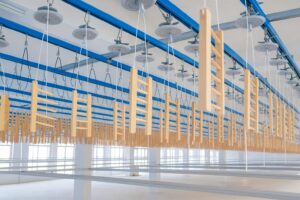What Are Montessori Play Kits and Why Are They Popular With Parents?
You worry about screen time and overwhelming toys. You want something that builds real skills and focus. But where do you even start with educational toys?
Montessori Play Kits are curated sets of simple, purposeful toys designed around developmental milestones. They are popular because they support independent learning, concentration, and sensory exploration in a calm, child-led way.

In my years as a wooden toy manufacturer, I’ve seen a huge shift. Parents and buyers, like my client Sophia in Germany, are increasingly looking for toys with purpose. They don’t just want entertainment; they want tools that help their children grow. This is where Montessori kits come in. They are based on the simple idea that children learn best through self-directed, hands-on experience. But I always remind my clients that the toy is only part of the equation. As the user insights suggest, these kits are most valuable when paired with a parent’s patient observation. The real magic happens when you provide the right tools and then step back to let your child discover.
How do Montessori kits differ from traditional toy sets?
Your playroom is cluttered with loud, plastic toys. They get played with once and then forgotten. You are searching for toys with lasting purpose and appeal.
Traditional toys often aim to entertain with distracting lights and sounds. Montessori kits focus on engaging a child’s curiosity with simple, single-purpose tools that encourage deep concentration and skill mastery.

The difference between these two approaches is fundamental. It’s about empowering the child versus simply distracting them. When we design our products, we focus on the "Montessori way" because it respects the child as an active learner, not a passive audience. A traditional toy might have ten buttons, each playing a different sound. This often leads to frantic button-mashing rather than thoughtful engagement. It overstimulates and teaches very little. A Montessori toy, in contrast, has one single, clear purpose. A set of pegs is for putting pegs in holes. A puzzle is for solving a puzzle. This clarity allows the child to focus, persist through challenges, and experience the profound satisfaction of accomplishing a task on their own.
| Feature | Montessori Kits | Traditional Toy Sets |
|---|---|---|
| Purpose | To facilitate child-led skill development and concentration. | To entertain and provide immediate stimulation. |
| Design | Simple, clear, and focused on a single skill. | Often complex, multi-functional, with lights and sounds. |
| Materials | Natural materials like wood, metal, cotton to engage the senses. | Primarily plastic and synthetic materials. |
| Child’s Role | Active explorer and problem-solver. | Passive operator or audience. |
Why are parents and educators drawn to Montessori-inspired learning tools?
You hear wonderful things about Montessori education. You are curious about its benefits. But you’re not sure how to bring those principles into your home environment.
Parents and educators are drawn to these tools because they see clear results. Children become more independent, focused, and calm. The toys empower children to learn at their own pace without pressure.

The appeal is simple: these tools work. They are designed based on decades of observation of how children naturally learn and develop. For parents struggling with short attention spans or the need for constant entertainment, a Montessori approach can feel like a breath of fresh air. It shifts the dynamic from an adult needing to entertain a child to a child being able to entertain themselves in a productive, meaningful way.
Builds Rock-Solid Concentration
In a world full of distractions, the ability to focus is a superpower. The clear, uncluttered nature of Montessori toys helps children develop this skill. Because the toy presents a single, achievable challenge, a child can enter a state of deep focus, sometimes called "flow," which is incredibly satisfying for them and essential for all future learning.
Fosters True Independence
These toys are intentionally designed to be used without adult intervention. This builds a powerful sense of "I can do it myself." This feeling of competence is the bedrock of self-esteem and encourages a child to take on new challenges with confidence, both in play and in life.
What makes play kits effective for independent learning?
You need a moment to prepare dinner. But your child always needs your help with their toys. You want them to be able to play happily and learn on their own.
Montessori kits are highly effective for independent learning because they are self-correcting. A child can see their own mistakes and fix them without an adult’s help, which builds resilience.

The secret ingredient that promotes independence is what Dr. Montessori called the "control of error." This means the toy itself provides feedback. An adult doesn’t have to say, "No, that’s wrong." The child discovers it on their own. This is a respectful process that empowers the child and makes them a true problem-solver. We incorporate this principle into every Montessori-style product we make.
- Control of Error: Imagine a knobbed puzzle where each piece has only one specific spot it will fit into. If the child tries to force a piece into the wrong spot, it simply won’t go. The feedback is immediate and impersonal. The puzzle itself is the teacher.
- Isolation of Quality: A Montessori toy focuses on one single concept at a time. A set of stacking rings teaches the concept of size. A set of color tablets teaches color matching. This clarity prevents a child from getting confused or overwhelmed, allowing them to focus on and master one skill before moving to the next.
How do Montessori kits encourage practical life skills in early childhood?
You watch your toddler try to put on their own shoes. You want to help them become more capable and independent in their daily routines but are not sure how to practice.
Many Montessori kits include tools that mimic real-world activities. This includes items like small pitchers for pouring and frames for buttoning, which directly build real-world competence.

This is one of the most brilliant aspects of the Montessori philosophy. The "Practical Life" activities are designed to help children master their own bodies and their environment. These aren’t just make-believe toys; they are child-sized versions of real tools for real tasks. By practicing these activities, children develop the coordination, concentration, and fine motor control they need for everyday self-care. It’s incredibly empowering for a small child to be able to pour their own water or button their own coat.
Building Movement and Coordination
Activities like pouring beans from one pitcher to another, scooping, or using tongs to transfer pom-poms from one bowl to another train the hand and eye to work together. This builds the foundational skills needed for writing, eating with utensils, and so much more.
Mastering the Art of Self-Care
Specialized "dressing frames" with large buttons, zippers, snaps, and buckles allow a child to practice the complex motions of getting dressed in a low-pressure way. Success on the frame leads directly to success on their own clothing.
Are Montessori play kits suitable for a range of age groups?
You want to invest in toys that grow with your child. But it is hard to know what is appropriate for a baby versus a toddler or preschooler.
Yes, Montessori kits are specifically designed for different developmental windows. A kit for an infant focuses on sensory exploration and grasping, while a toddler’s kit introduces problem-solving and logic.

The Montessori approach is all about "following the child." This means providing the right materials at the right time to match their natural developmental urges. A well-designed series of play kits will do exactly this, offering progressively more complex challenges as the child grows. When we curate sets for our clients, we think carefully about this progression. The goal is to meet the child where they are, providing a challenge that is engaging but not frustrating.
| Age Range | Developmental Focus | Example Kit Activities |
|---|---|---|
| 0-12 Months | Sensory exploration, motor skills, tracking. | High-contrast images, wooden rattles, object permanence box. |
| 1-2 Years | Fine motor control, problem-solving, vocabulary. | Simple knobbed puzzles, stacking rings, posting activities. |
| 2-3+ Years | Practical life, logic, early math concepts. | Lacing beads, pouring sets, counting objects, dressing frames. |
This tailored approach ensures that the toys are always relevant and engaging, which is a much better investment than a single toy they will quickly outgrow.
How do Montessori kits support a screen-free home environment?
You feel constant pressure from screens. You want to provide engaging alternatives but struggle to compete with the immediate gratification of tablets and television.
Montessori kits offer a deeply engaging, tactile alternative to screens. They encourage active problem-solving and deep focus, satisfying a child’s developmental needs in a healthy, hands-on way.

Creating a screen-free or low-screen environment isn’t about taking something away; it’s about offering something better. Montessori toys are the perfect antidote to the passive consumption of digital media. They invite a child into a world of physical exploration, sensory richness, and mental challenge that a flat screen simply cannot replicate. Instead of staring at a screen, a child is using their hands, training their eyes, and engaging their whole body in learning. This active engagement develops the inner resources a child needs to self-entertain and find joy in the real world. A child who can become deeply absorbed in sorting beads or completing a puzzle is learning to find stimulation within themselves, a skill that will serve them for their entire life. This is a true, lasting gift.
Conclusion
Montessori kits are powerful tools for fostering independence and concentration. But they are just one part. The parent’s patient observation and respect are what truly matter.












